Hwyl fawrpublished at 18:42 GMT 27 November 2019
That's it from the Siambr for today.
Senedd Live returns on Tuesday 3 December.
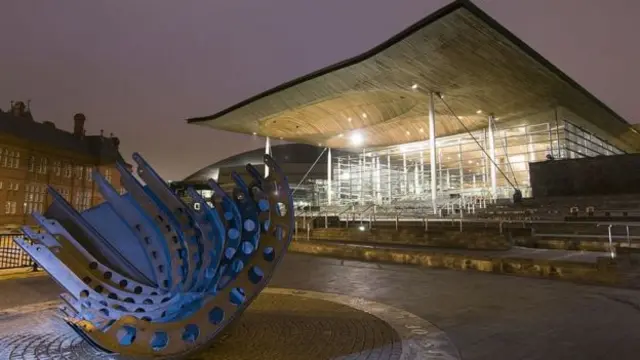 Image source, Getty Images
Image source, Getty ImagesAMs pass bill agreeing votes for 16 and 17-year-olds and renaming the assembly Senedd Cymru/Welsh Parliament.
Plenary begins at 1.30pm with Questions to the Minister for Education
Questions to the Minister for Health and Social Services
Debate: Stage 4 of the Senedd and Elections (Wales) Bill
Member Debate under Standing Order 11.21(iv) - Pancreatic Cancer
Welsh Conservatives Debate - Welsh Government Funding
Brexit Party Debate - Lobbyist Register
Short Debate - Bus services in Wales.
Alun Jones and Sarah Down-Roberts
That's it from the Siambr for today.
Senedd Live returns on Tuesday 3 December.
 Image source, Getty Images
Image source, Getty ImagesThe topic chosen for the Short Debate by Mark Reckless (South Wales East), external is bus services in Wales.
He analyses data and asks "could we not be doing better in terms of how much people use the bus, particularly to commute to work, and are there lessons from other parts of the UK?".
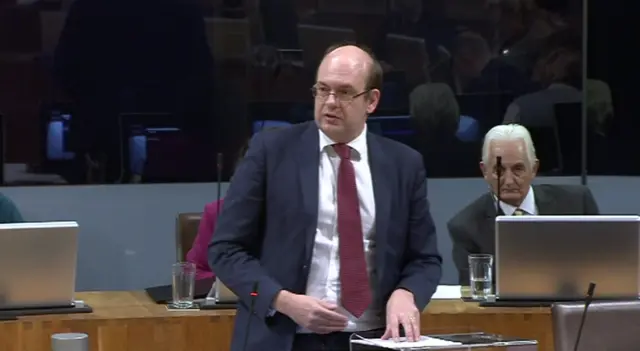
The Brexit Party motion is amended by the Conservatives and then passed by AMs.
The Welsh Conservative motion on Welsh Government funding is amended almost in its entirety by the Welsh Government, and is then passed by AMs.
There were 24 for, no abstentions and 22 against.
Jane Hutt, the Deputy Minister and Chief Whip, says the Welsh Government will support the Conservative amendment "as this is principally a matter for the assembly commission".
Earlier this year, the Welsh Government says it has acted to restrict professional lobbyists' access to ministers after details of a meeting emerged.
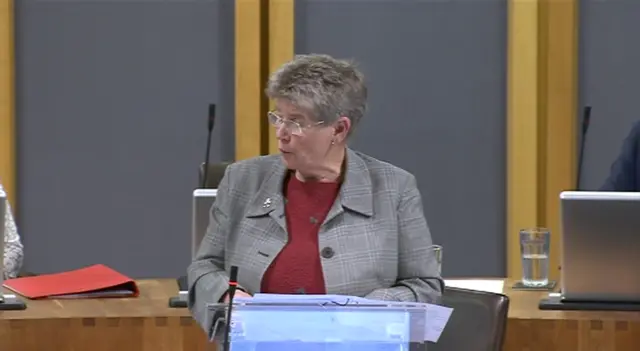
Dai Lloyd confirms that Plaid Cymru will vote in favour of implementing a lobbyist register for Wales.
Assembly standards committee chairwoman Jayne Bryant explains that the committee looked at the case for regulation, and says said it found little evidence to support a voluntary register, but a group of AMs have been asked to voluntarily reveal details for a pilot scheme, to be evaluated in 2020.
Lobbyists are companies or individuals paid to influence government decisions.
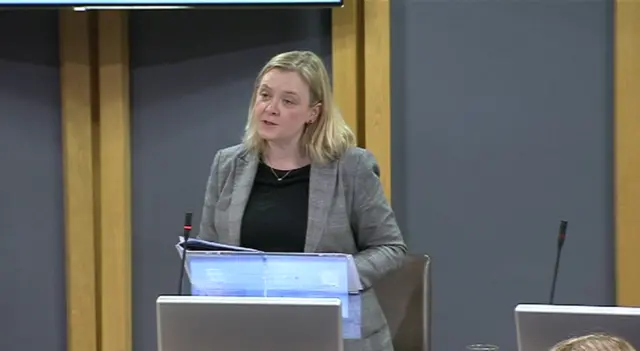 Image source, bbc
Image source, bbcOnly one amendment has been tabled to the Brexit Party motion.
Conservative Andrew RT Davies moves the party's motion to delete points 2 and 3 and replace with:
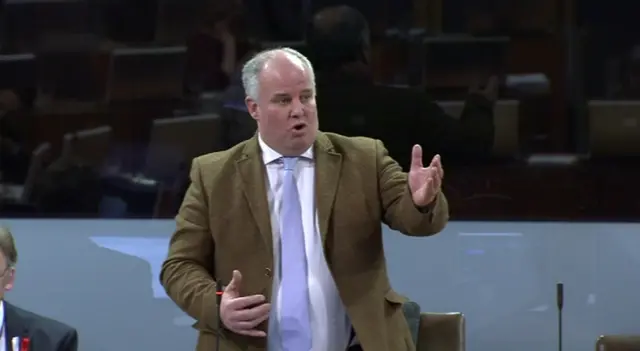
The topic chosen by the Brexit Party for their debate is a lobbyist register. Their motion, moved by Caroline Jones, proposes that the National Assembly for Wales:
1. Notes that the National Assembly for Wales is the only national legislature in the UK without a lobbyist register.
2. Believes that a lobbyist register would help to promote openness and transparency in Welsh politics.
3. Calls on the Welsh Government to consult immediately on implementing a lobbyist register for Wales.
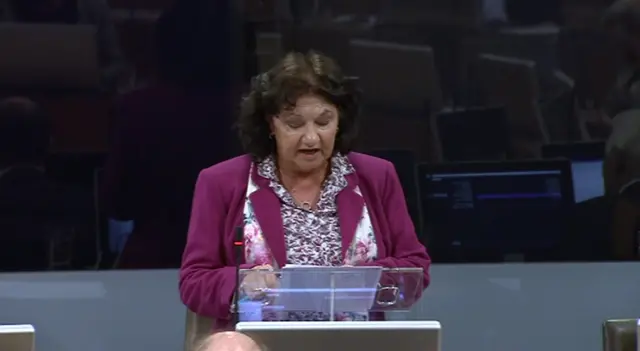
The Welsh Government's amendment, moved by Rebecca Evans the Minister for Finance and Trefnydd, is to delete all after point 1 and replace with:
a) spending per person on health and social services was the highest of the four UK countries and 11 per cent higher than in England;
b) spending per person on education was 6 per cent higher than spending per person in England.
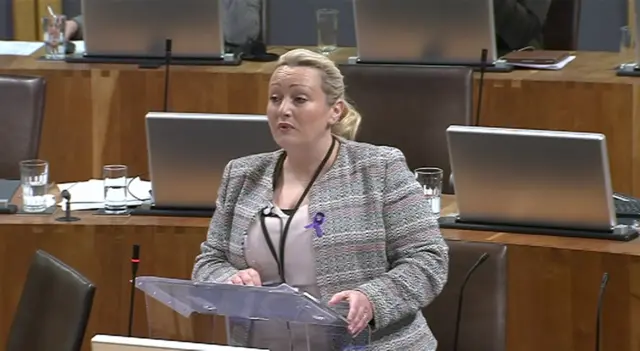
Plaid Cymru's amendment, moved by Rhun ap Iorwerth, is to delete the entire Conservative motion and replace with a proposal that the National Assembly for Wales:
1. Believes that successive Westminster Governments – under both Labour and the Conservatives – have presided over intergenerational poverty and chronic underinvestment in Wales.
2. Believes that having the economic and fiscal levers of an independent country is the key to Wales’s future economic prosperity.
The topic chosen by the Welsh Conservatives for their debate is "Welsh Government funding".
The proposal moved by Nick Ramsay is that the National Assembly for Wales:
1. Believes that Wales benefits from being part of the United Kingdom.
2. Notes that, as a result of the Fiscal Framework agreed between the Welsh and UK Governments, Wales currently receives £1.20 per head for every £1 spent per head in England on devolved matters.
3. Welcomes the additional £790 million over and above the Welsh block grant which has been committed by the UK Government towards Growth Deals across Wales.
4. Recognises that the funding available for the Welsh Government is at record levels.
5. Calls upon the Welsh Government to:
a) use any additional resources which arise as a result of increased investment on the NHS by the UK Government to improve the Welsh health service;
b) use any additional resources which arise as a result of increased investment on education by the UK Government to improve the Welsh education system;
c) rule out any tax rises or new taxes in Wales between now and the next elections to the National Assembly for Wales.
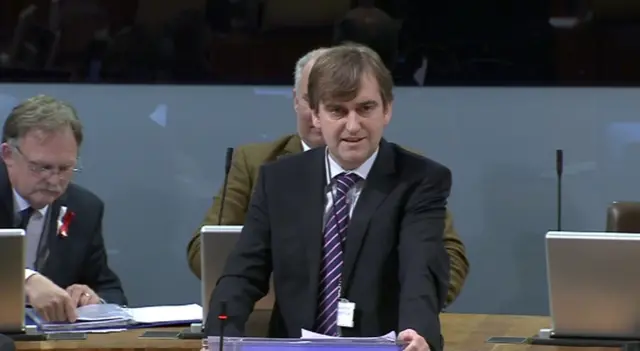
Health and Social Services Vaughan Gething highlights the new "single cancer pathway across Wales".
He explains the introduction of a single cancer pathway replaces the urgent suspected cancer (USC) and non-urgent suspected cancer (nUSC) pathways.
He says this marks a significant step forward for Wales.
A patient’s waiting time will begin from the point of a suspicion of cancer rather than the point of diagnosis.
The motion by Lynne Neagle has widespread support.
Its co-submitters are Plaid Cymru's Dai Lloyd (South Wales West), external and Conservative David Melding (South Wales Central), external.
Its supporters are:
Delyth Jewell (South Wales East), external
Joyce Watson (Mid and West Wales), external
Mark Isherwood (North Wales), external
Neil Hamilton (Mid and West Wales), external
We move on to the Member Debate under Standing Order 11.21(iv) - pancreatic cancer.
Lynne Neagle (Torfaen), external proposes that the National Assembly for Wales:
1. Recognises that one in four people diagnosed with pancreatic cancer in the UK do not survive the disease beyond a month and three in four do not survive beyond a year, many because they were not treated quickly enough.
2. Recognises in Wales there are around 500 new cases of pancreatic cancers every year, and that, in 2015, some 508 people were diagnosed with pancreatic cancer and in the same year some 451 people died of the disease.
3. Recognises pancreatic cancer is the deadliest common cancer with a dismal prognosis that has hardly changed in the last 45 years.
4. Welcomes Pancreatic Cancer Awareness Month (November) and the work Pancreatic Cancer UK does to promote awareness around the lowest surviving and quickest killing cancer.
5. Calls on Welsh Government to take action to improve survival rates for people with pancreatic cancer in Wales through:
a) faster treatment, by learning from fast-track surgery models in England that have shown promising results;
b) earlier diagnosis, by learning from Rapid Diagnostic Centres being rolled out in England and piloted by Swansea Bay University Health Board and Cwm Taf Morgannwg University Health Board; and
c) holistic support, through timely dietary and nutritional support to enable patients to better tolerate treatment.

There are around 500 new cases of pancreatic cancers every year in Wales
AMs approve the Senedd and Elections (Wales) Bill.
There were 41 for, no abstentions and 19 against.
The bill will become law in January, with 16-and-17-year-olds able to vote for the first time in Wales at the Senedd elections in 2021.
There is generally a four-stage process for the consideration of a Public Bill involving:
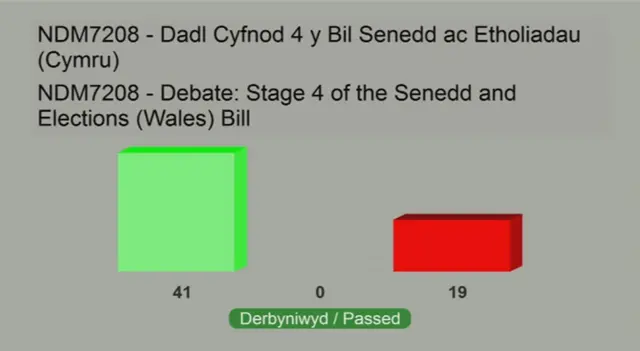
Mark Reckless of the Brexit Party says the bill contains “deeply divisive and highly partisan clauses around foreign national voting”.
Rhun ap Iorwerth of Plaid Cymru hails votes at 16 but is disappointed at the choice of name. He wanted Senedd. "It was a lack of confidence perhaps. Was it fear? Fear of what, I'm not sure."
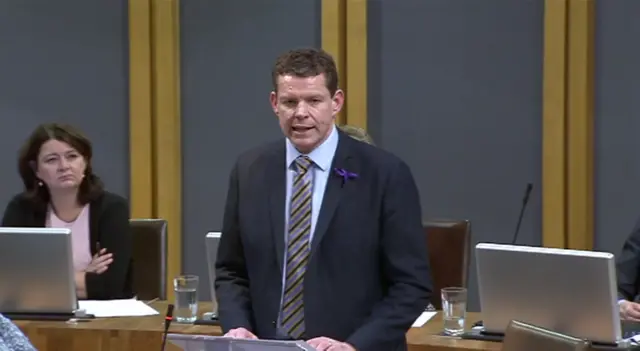
Conservative David Melding says he is "very disappointed" the Conservatives are not able to support the bill.
He claims the bill has been "hijacked" by the Welsh Government. “In introducing the right for foreign nationals to vote this bill becomes unsupportable," he says.
While Labour and Plaid Cymru are expected to support the law, the Conservatives and Brexit Party are planning to vote it down.
Votes from Plaid Cymru, Labour backbench AMs and government ministers should be enough to get the bill through the 40 AM threshold needed.
The assembly was given the power over the institution's own affairs, including elections, in 2017 as long as two-thirds of the body agree any changes.
The Llywydd Elin Jones and the deputy presiding officer Ann Jones do not usually vote but will be able to for this bill, under the rules governing the assembly.